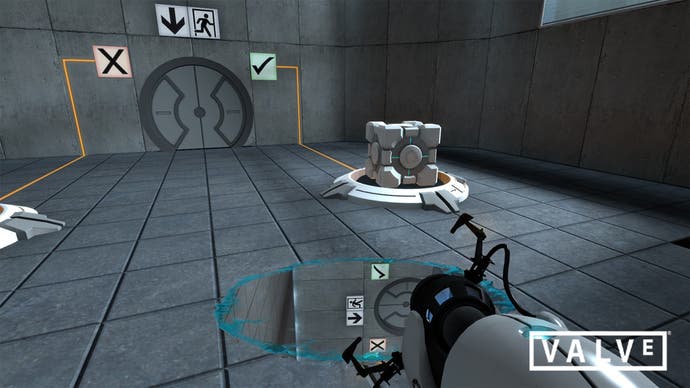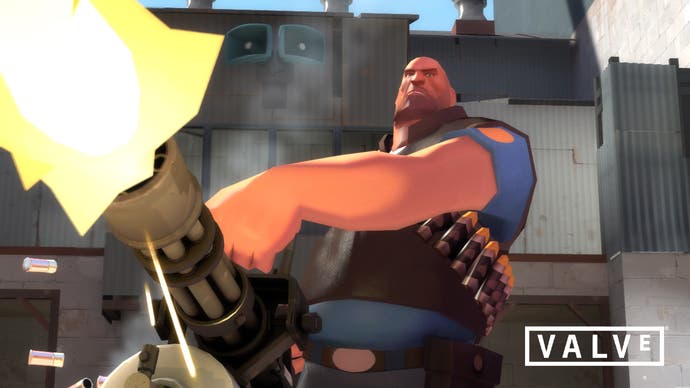Valve's Gabe Newell
On Orange Box, Steam, Wii controls, next-gen.
Gosh! It seems like only 3 months and 8 days ago that we last sat down for half an hour with Valve co-founder Gabe Newell, which is probably because that was when we last sat down with him. He said lots of things back then, so for our Games Convention chat this past week we were able to skip some of the pleasantries and talk in more depth about Orange Box, Steam, Wii controls and which is better PlayStations or Xboxes. Only kidding. Sort of. Plus we talked about those excellent TF2 movie shorts - have you watched the Soldier one yet? Read on also for Gabe using a swearword, which we think is an exclusive. Enjoy.
No - we just need to get Orange Box out the door before we start talking about Episode Three.
I think we've learned a lot about subtle cuing, about character development. There is this fundamental challenge with storytelling in this environment, which is the lead character doesn't talk and doesn't have a script, so how do you learn about yourself without breaking immersiveness? How can you be Gordon Freeman while we're actually trying to get you to travel? And we do that through the characters around, by their reactions, by their emotional annotation of the world - 'this makes me feel this way, hint hint, nudge nudge, which is probably how you should be feeling as well'. So there's a lot about the mechanics of the storytelling, and how to move forward without breaking the player's sense of their being a participant in it.
There's always a tension between finishing off some story elements - one of the challenges of serial drama, whether you're a TV show or a videogame series, is how you keep things moving forward and give people a sense of closure while giving them something to look forward to the next time. We read all those threads, and we certainly pay attention to what people say. Hopefully we're getting better. For example, I think the end of the Portal episode in The Orange Box is one of the strongest endings we've ever done, and I think that's a reflection of the feedback we've received to the endings for our games up until now.

It does, and there are a lot of things in the environment if you decide to go looking for them. There's a story there - there's an even deeper story that's sort of embedded into the environment if you want to go looking for it and you're interested in that part of our games. I think that you'll learn more about the character you're playing and the events of Aperture Science as they relate to what happened at Black Mesa and subsequent games.
We're really happy. People are playing it here, the response here's been great. I don't suppose you've seen the Meet the Soldier movie?
So, to really feel like we're getting a handle on who these characters are, and how they relate to the classes, we feel really good about the art choice we made - having that derived from a sense of what the gameplay was supposed to be, and be in the service of the gameplay. We're really happy with how the game turned out, even though we first showed it in 1999! Now the ball's in Duke Nukem Forever's camp to be the longest-delayed videogame in actual development.
I think that we've spent a lot of time trying to figure out how to do a good job for developers and publishers, as tools for other developers. Now I think we need to turn our focus to providing more value to consumers. Community stuff is a part of that, really driven out of a sense of how to support the social aspect of gaming in a PC environment. I think there are lots of other opportunities for us to provide value directly to gamers to make it more useful to have Steam sitting there, so that it's not just something haranguing you with a series of ads begging you to spend more money, but it's something that actually has a lot of utility for a gamer.

The thing that we struggle with - so, we use Steam to look at what our customers are actually buying and what they have installed, and right now there's far more DX10 hardware on XP than there is on Vista. About 2 percent of our customers have Windows Vista and DX10 hardware, so for us the investment strategy is to access DX10 hardware functionality - like the tessellater - using the DX9 API, and we can get what we need, we can get access to that hardware functionality, maybe in a non-optimal way, by going through DX9. Until we start to see a much higher percentage of our customers flipping over to Vista, that's the strategy we're going to use.
One of the things I want to do - to follow up from some conversations I've had here at Leipzig - is I want to get a clearer idea of what percentage of customers are actually playing against bots versus playing against real people, and maybe make some changes in our bots to see if that's a choice or a function of the limitation of quality of the bots. My sense is that most people play against other people and it's not a function of the bots, it's a question of wanting to actually play socially. So we'll be able to find that out.
Then there's just nuts and bolts stuff, like where people are getting stuck in our games - that's always really interesting - the automatic weapon-balancing in Counter-Strike - it's interesting to watch how the prices vary - so we learn a lot all the time. Anybody in the company can sit there, and we have a variety of tools for looking at that data in real time, so everybody in the company's sitting there eating their sandwich trying to slice the data in interesting ways.

